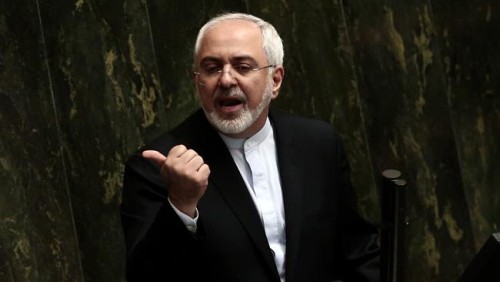PHOTO: Foreign Minister Mohammad Javad Zarif addresses the Iranian Parliament on Tuesday (AFP)
Iran’s Foreign Minister Mohammad Javad Zarif struck a tough pose on Tuesday in Parliament as he addressed legislators about last week’s nuclear deal with the 5+1 Powers.
Trying to defuse any hardline criticism of the agreement, Zarif said that a mechanism for re-imposition of UN sanctions was not just for any Iranian violations of the terms.
He said the “snap-back” provision could also be applied to the US and its allies, and declared that even a possible vote for re-imposition on Iran would be costly for the reputation of the UN Security Council.
Under last Tuesday’s agreement in Vienna, any of the 5+1 Powers (US, Britain, China, Germany, Russia, and France) can raise a perceived Iranian violation and submit it to a Dispute Resolution Panel. If issues are unresolved after 30 days, UN sanctions would automatically be re-imposed.
Zarif declared that there had not been even a “one-day stop” in Iran’s nuclear program. He referred to one of his claimed remarks during the often-heated discussions in Vienna, “No one can ever threaten an Iranian,” and jabbed at Israel: “The much-hated Zionist regime has never been this much isolated among its allies.”
#Iran FM Zarif: It was proved one more time for the US that, as supreme leader said, they can only see Iran's surrender in their dreams.
— Abas Aslani (@abasinfo) July 21, 2015
In a more conciliatory remark, he said the agreement was the product of useful compromise:
We have never claimed and do not claim that the JCPOA is completely to the benefit of Iran; I emphasize that negotiating is basically giving and taking, and unless a significant level of the two sides’ demands are met, no agreement is reached.
Since the deal was announced, Zarif has led the Government’s attempt to blunt any hardline attempt to undermine the agreement. On Monday, he pushed back a remark by US Defense Secretary Ashton Carter that Washington retained its “military option”: “These individuals do not seem to be able to understand that the use of force to violate others’ rights is not an option, but a dangerous and injudicious temptation.”

